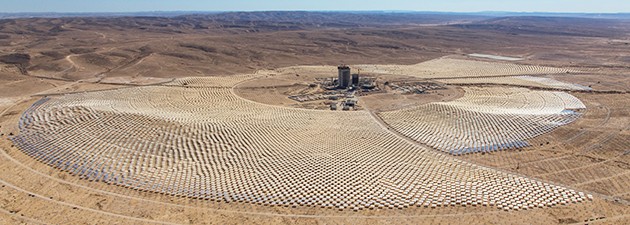By David Lazarus
View the original article here.
The state-of-the-art thermal electric power plant in Israel’s Negev Desert is equipped with more than 50,000 computer-controlled heliostats that produce enough power for 150,000 homes, keeping 110,000 tons of CO2 emissions out of the air per year.
The Ashalim solar and thermal electric power plant in Israel’s Negev Desert is up and running. The state-of-the-art facility is equipped with more than 50,000 computer-controlled heliostats or mirrors, which can track the sun in two dimensions and reflect the sunlight onto a boiler placed on top of a tower measuring 240 m-high (787.4 ft). That’s higher than some of the tallest sky scrapers in the world and by far the tallest solar tower ever built.
How does it work? All those tens of thousands of mirrors are hooked up to a computer operated tracking system so that they all move precisely with the orbit of the earth around the sun throughout the day and direct the heat from the sunlight to a spot on the boiler on top of the tower to within 0.0015499969 of an inch. The super hot water in the boiler produces superheated steam, which is then conveyed through pipes down below with enough pressure to spin a steam turbine-generator at astronomical speeds needed to produce electricity. The solar run generator can put out 300 megawatts of clean electricity every day, or enough to power about 150,000 homes.
Another feature of the Ashalim project is the use of solar thermal technology that can store energy for use at night in order to provide consistent and reliable output of electricity. This is one of the largest renewable energy projects in the world. The facility covers an area of over 3 sq. km (2 sq. miles).
Israel’s climate is ideal for solar power, particularly in the Negev which enjoys more than 300 sunny days a year. Israel has been home to many solar technology breakthroughs, but the government has been slow in getting away from using fossil fuels for power. But that is definitely starting to change with a goal getting 10 percent of its energy needs from renewable sources by 2020 with the new solar project. Once the project is proven fully successful, Israel plans to move ahead rapidly towards renewable energy sources.
Together with the recent discovery of huge deposits of natural gas along Israel’s Mediterranean Coast, the Ashalim plant will contribute to Israel’s security by reducing dependence on fossil fuel imports. It will also keep us safe by keeping 110,000 tons of CO2 emissions per year out of the air we breathe.

